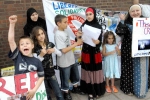« Surprises "comedy" in the cause of "the martyr of the government," Menoufia | HomePage | Muslim landlords force Christians to evict their homes »
29 June 2010
From star FBI witness to ostracism, loss
sitting at the kitchen table in his two-bedroom apartment trying to make sense of what has happened to him.
He has an eviction notice for overdue rent, an application for welfare, a foundering export business, and an uncertain immigration status.
The South Jersey apartment is sparsely furnished. There is little food in the refrigerator.
Omar is living week to week, sometimes day to day, with his American-born wife, Jessica, who grew up in Maple Shade, and their two children, a daughter, 6, and a son, 3.
"How can this be?" he asks, his eyes flashing anger, dismay, and disappointment. "It was a good case. I help. Now I have what?"
His heavily accented voice trails off. "Nothing."
Chain-smoking cigarettes, Omar, 41, was talking publicly for the first time about his experience as an informant enlisted by the FBI as its point man in the Fort Dix investigation, and about the impact the case and its aftermath have had on his life.
Eighteen months after a federal jury in Camden convicted all five defendants, the star witness is unsure of his future and has doubts about his past.
Did he do the right thing?
Would he do it again?
What, if anything, does the government owe him?
Are he and his family collateral damage in the war on terror, cast adrift in a bureaucracy that has done little to acknowledge his contribution?
Or is he facing the predictable consequences of his own actions, a Muslim caught in a cultural and ethnic no-man's-land, unable to return to his roots, yet out of place in American suburbia?
"I lost my people," Omar said during one in a series of rambling interviews over the last month. "I lost my religion. And I can do nothing about it."
Unless you come from his culture, he said, it is almost impossible to understand what that means.
For Omar, his ability to function in America was built around a network of friends, relatives, and associates in the Muslim community.
That network, he said, no longer exists for him.
He has been ostracized because of what he did.
No matter, he said, that the five men he helped convict were accused of plotting to kill American soldiers. In a twisted way, he said, their actions are understandable in the Muslim community.
23:02 Posted in UNITED STATES | Permalink | Comments (0) | ![]() Facebook |
Facebook |




















The comments are closed.